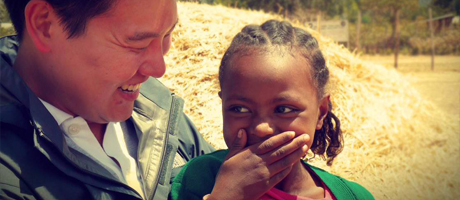Mac Kibum Lee calls himself a searcher. Just 22, the political science major finds himself pondering questions that scholars and statesmen spend a lifetime studying: Why is it so impossible to resolve global conflicts? What does peace actually look like? And, most importantly, where do I fit in? What can I do to improve people’s lives?
“We all ask: What do I want to achieve?” said Lee, now in his senior year. “For me, the answer was: I want to strive for peace. I want to make a difference.”
Lee’s quest has taken him around the world—from his native South Korea, where, as a child, he lived in the threatening shadow of saber-rattling neighbors to the north; to the United Nations, where he joined disarmament debates; to Africa, where he delivered much-needed health care services to impoverished mothers and children.
But of all the places Lee looked for answers, perhaps the least expected—and most inspiring—was a classroom. Lee is minoring in peace studies, and his goals and philosophy were forged in classes with Irene Oh, Peace Studies director and associate professor in the Department of Religion. This fall, Lee repaid what he considers a debt of gratitude by making a sizable donation to the program—a student gift that, according to Oh, is unprecedented in the 30-year history of Peace Studies at the university.
“When someone is actually willing to contribute such a generous gift, it speaks volumes about how they feel about the value of a program,” Oh said.
Lee attached no conditions to the donation. Oh said the funds will be used for enhanced programming and resources to raise the profile of the Peace Studies Program and attract students. Some of the money will be earmarked to sponsor a film on peace and conflict that will be shown on campus and elsewhere. The gift will also support undergraduate travel for those invited to present papers at national conferences.
Although Peace Studies didn’t become a major until 2011, the program already has 30 majors and minors, up from just three minors in 2009. The interdisciplinary curriculum—which combines such fields as religion, sociology, and history—attracts everyone from political science majors to philosophy students to pre-meds. About a quarter of Oh’s students are Elliot School of International Affairs attendees looking for a liberal arts perspective on peace and conflict. Like Lee, many of Oh’s students turn their classwork into fieldwork. She’s seen Peace Studies veterans volunteer at schools in Thailand, construct green housing projects in Texas, and enroll in Teach for America.
“It’s always exciting when students make the connections between what they learn in the classroom and what they see on the ground,” Oh said.
A Better Way
Few students have taken a Peace Studies path quite like Lee’s. Born in South Korea, his world-view was colored by the looming threat of neighboring North Korea. “We are confronted with it all the time,” he said. “The fear of an imminent attack is always floating around you.”
As a student at GW, Lee chose a political science major, but found his interests gravitating toward peace studies. In Oh’s class, he read great thinkers from Greek philosophers like Plato and Aristotle to modern peace advocates like Gandhi and Martin Luther King. “Professor Oh helped me see that there are many ways to go about achieving peace,” Lee said. “It was my challenge to find the one that was best for me.”
In 2011, between his junior and senior year, Lee took time-off from school to put his lessons into action. For eight months, he interned with the South Korean delegation to the United Nations Disarmament Committee. While he was honored to help represent his country, he was frustrated by the committee’s protracted debates. “They talk about same things over and over and over again—and nothing ever gets done,” he said. “It made me think: There’s got to be a better way.”
Lees’ search led him next to Africa. For six months, he volunteered for maternal-and-child health projects with KOICA, South Korea’s international development agency. He helped manage a hospital in Ethiopia, where more than 250,000 children under the age of five die each year. “It’s an eye-opener, seeing children living in mud houses, eating dirt,” he recalled. “It’s a reminder of all the opportunities we have to change somebody’s life for the better.” In Malawi, Lee was shaken by the sight of a mother staggering into a hospital ward with a dead child in her arms. “She walked for five hours straight,” he said. “She knew her daughter was dead from malaria, but she still carried the cold body to the hospital. You can’t see something like that and not want to help.”
This fall, Lee returned to campus with a renewed purpose. Meeting with Oh, he recounted the stops on his journey. His first steps toward understanding, he realized, were made in her classroom. “He told me how much Peace Studies had influenced him and he wanted to make this gift,” Oh said. “Honestly, I was shocked. Nothing like this has happened here before.”
For Lee, expanding the Peace Studies program is a means to inspire other students to action. “If [Peace Studies] branches out, if it gets bigger and reaches more students, then the next great person who affects world peace may sit in this classroom,” he said.
After his studies, Lee plans to continue his work in Africa, perhaps by consulting with multi-national companies on corporate responsibility projects. “My vision is that peace can be achieved through development,” he said. And his gift to Peace Studies isn’t the last stop in his search: “I’m always on the move, always looking for answers. It’s like being on a train. I’m just heading to the next station.”


